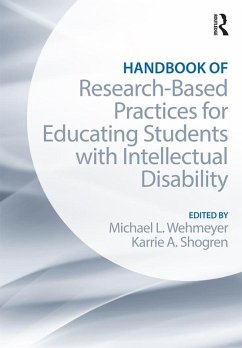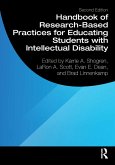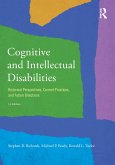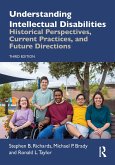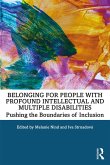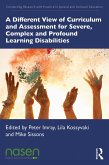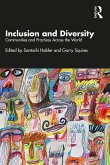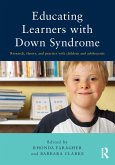Handbook of Research-Based Practices for Educating Students with Intellectual Disability (eBook, PDF)
Redaktion: Shogren, Karrie A.
109,95 €
109,95 €
inkl. MwSt.
Sofort per Download lieferbar

55 °P sammeln
109,95 €
Als Download kaufen

109,95 €
inkl. MwSt.
Sofort per Download lieferbar

55 °P sammeln
Jetzt verschenken
Alle Infos zum eBook verschenken
109,95 €
inkl. MwSt.
Sofort per Download lieferbar
Alle Infos zum eBook verschenken

55 °P sammeln
Handbook of Research-Based Practices for Educating Students with Intellectual Disability (eBook, PDF)
Redaktion: Shogren, Karrie A.
- Format: PDF
- Merkliste
- Auf die Merkliste
- Bewerten Bewerten
- Teilen
- Produkt teilen
- Produkterinnerung
- Produkterinnerung

Bitte loggen Sie sich zunächst in Ihr Kundenkonto ein oder registrieren Sie sich bei
bücher.de, um das eBook-Abo tolino select nutzen zu können.
Hier können Sie sich einloggen
Hier können Sie sich einloggen
Sie sind bereits eingeloggt. Klicken Sie auf 2. tolino select Abo, um fortzufahren.

Bitte loggen Sie sich zunächst in Ihr Kundenkonto ein oder registrieren Sie sich bei bücher.de, um das eBook-Abo tolino select nutzen zu können.
The Handbook of Research-Based Practices for Educating Students with Intellectual Disability provides an integrated, transdisciplinary overview and research-based practices for teaching students with intellectual disability.
- Geräte: PC
- mit Kopierschutz
- eBook Hilfe
- Größe: 3.01MB
Andere Kunden interessierten sich auch für
![Handbook of Research-Based Practices for Educating Students with Intellectual Disability (eBook, PDF) Handbook of Research-Based Practices for Educating Students with Intellectual Disability (eBook, PDF)]() Handbook of Research-Based Practices for Educating Students with Intellectual Disability (eBook, PDF)109,95 €
Handbook of Research-Based Practices for Educating Students with Intellectual Disability (eBook, PDF)109,95 €![Cognitive and Intellectual Disabilities (eBook, PDF) Cognitive and Intellectual Disabilities (eBook, PDF)]() Stephen B. RichardsCognitive and Intellectual Disabilities (eBook, PDF)103,95 €
Stephen B. RichardsCognitive and Intellectual Disabilities (eBook, PDF)103,95 €![Understanding Intellectual Disabilities (eBook, PDF) Understanding Intellectual Disabilities (eBook, PDF)]() Stephen B. RichardsUnderstanding Intellectual Disabilities (eBook, PDF)78,95 €
Stephen B. RichardsUnderstanding Intellectual Disabilities (eBook, PDF)78,95 €![Belonging for People with Profound Intellectual and Multiple Disabilities (eBook, PDF) Belonging for People with Profound Intellectual and Multiple Disabilities (eBook, PDF)]() Belonging for People with Profound Intellectual and Multiple Disabilities (eBook, PDF)38,95 €
Belonging for People with Profound Intellectual and Multiple Disabilities (eBook, PDF)38,95 €![A Different View of Curriculum and Assessment for Severe, Complex and Profound Learning Disabilities (eBook, PDF) A Different View of Curriculum and Assessment for Severe, Complex and Profound Learning Disabilities (eBook, PDF)]() A Different View of Curriculum and Assessment for Severe, Complex and Profound Learning Disabilities (eBook, PDF)28,95 €
A Different View of Curriculum and Assessment for Severe, Complex and Profound Learning Disabilities (eBook, PDF)28,95 €![Inclusion and Diversity (eBook, PDF) Inclusion and Diversity (eBook, PDF)]() Inclusion and Diversity (eBook, PDF)38,95 €
Inclusion and Diversity (eBook, PDF)38,95 €![Educating Learners with Down Syndrome (eBook, PDF) Educating Learners with Down Syndrome (eBook, PDF)]() Educating Learners with Down Syndrome (eBook, PDF)40,95 €
Educating Learners with Down Syndrome (eBook, PDF)40,95 €-
-
-
The Handbook of Research-Based Practices for Educating Students with Intellectual Disability provides an integrated, transdisciplinary overview and research-based practices for teaching students with intellectual disability.
Dieser Download kann aus rechtlichen Gründen nur mit Rechnungsadresse in A, B, BG, CY, CZ, D, DK, EW, E, FIN, F, GR, HR, H, IRL, I, LT, L, LR, M, NL, PL, P, R, S, SLO, SK ausgeliefert werden.
Produktdetails
- Produktdetails
- Verlag: Taylor & Francis eBooks
- Seitenzahl: 524
- Erscheinungstermin: 14. Oktober 2016
- Englisch
- ISBN-13: 9781317566243
- Artikelnr.: 46883257
- Verlag: Taylor & Francis eBooks
- Seitenzahl: 524
- Erscheinungstermin: 14. Oktober 2016
- Englisch
- ISBN-13: 9781317566243
- Artikelnr.: 46883257
- Herstellerkennzeichnung Die Herstellerinformationen sind derzeit nicht verfügbar.
Michael L. Wehmeyer is the Ross and Mariana Beach Distinguished Professor of Special Education and Director and Senior Scientist at the Beach Center on Disability, University of Kansas, USA. He is a past president of the American Association on Intellectual and Developmental Disabilities and founding co-editor of the AAIDD journal Inclusion. Karrie A. Shogren is Professor of Special Education and Senior Scientist and Director of the Kansas University Center on Developmental Disabilities, University of Kansas, USA. She is founding co-editor of the AAIDD journal, Inclusion, and co-editor of the journal, Remedial and Special Education.
Section I: Understanding Intellectual Disability
Chapter 1 Historical Understandings of Intellectual Disability and the
Emergence of Special Education
Michael L. Wehmeyer, J. David Smith
Chapter 2 Reframing Educational Supports for Students with Intellectual
Disability Through Strengths-Based Approaches
Karrie A. Shogren, Michael L. Wehmeyer, Robert L. Schalock, James R.
Thompson
Chapter 3 Supports and Support Needs in Strengths-Based Models of
Intellectual Disability
James R. Thompson, Karrie A. Shogren, Michael L. Wehmeyer
Chapter 4 Implications of Strengths-Based Models of Disability for the
Education of Students with Intellectual Disability
Michael L. Wehmeyer, Karrie A. Shogren
Section II: Eligibility, Assessment, and Educational Planning
Chapter 5 Measuring Intellectual Functioning and Adaptive Behavior in
Determining Intellectual Disability
Marc J. Tassé, Margaret H. Mehling
Chapter 6 Measuring Support Needs and Supports Planning
James R. Thompson, Carolyn Hughes, Virginia Walker, Stephanie DeSpain
Chapter 7 Alternate Assessment
Meagan Karvonen, Shawnee Wakeman, Neal Kingston
Chapter 8 Individualized Education Programs to Promote Access to the
General Education Curriculum for Students with Intellectual Disability
Michael L. Wehmeyer, Suk-Hyang Lee
Chapter 9 Planning for Other Educational Needs and Community-Based
Instruction
David W. Test, Fred Spooner, Debra Holzberg, Colleen Robertson, Luann Ley
Davis
Chapter 10 Transition Planning
James E. Martin, Amber E. McConnell
Chapter 11 Person-Centered and Student-Directed Planning
Karrie A. Shogren, Michael L. Wehmeyer, James R. Thompson
Section III: Schoolwide and Classroomwide Academic and Behavioral Supports
Chapter 12 Multi-Tiered Systems of Supports
Karrie A. Shogren, Michael L. Wehmeyer, Kathleen Lynne Lane, Carol Quirk
Chapter 13 Positive Behavior Supports for Students with Intellectual
Disability
Glen Dunlap, Donald Jackson, Ashley Greenwald
Chapter 14 The Role of Technology in Implementing Universal Design for
Learning
Loui Lord Nelson, Mindy Johnson
Chapter 15 Supporting the Social Lives of Students with Intellectual
Disability
Elizabeth E. Biggs, Erik W. Carter
Chapter 16 Self-Determination and Goal Attainment
Karrie A. Shogren, Michael L. Wehmeyer
Chapter 17 Educating Students in Inclusive Classrooms
Jennifer Kurth, Susan Marks, Jody Bartz
Chapter 18 Research-based Practices for Fostering Trusting Partnerships
with Families in Educating Students with Intellectual Disability
Kathleen Kyzar, Shana J. Haines, Ann P. Turnbull, Jean Ann Summers
Chapter 19 Teaching Reading and Literacy Skills to Students with
Intellectual Disability
Susan R. Copeland, Elizabeth B. Keefe
Chapter 20 Teaching Mathematics and Science to Students with Intellectual
Disability
Alicia Saunders, Diane Browder, Jenny Root
Section IV: Education across the Lifespan
Chapter 21 Early Intervention and Early Childhood Education
Michaelene M. Ostrosky, Rosa Milagros Santos, Hasan Y. Zaghlawan
Chapter 22 High Quality Educational Programs for Students with Intellectual
Disability in Elementary School
Kendra Williams-Diehm, Susan B. Palmer
Chapter 23 High Quality Educational Programs for Students with Intellectual
Disability in Middle and Junior High School
Colleen A. Thoma, Kimberly Wolowiec Fisher, Sarah Hall, LaRon A. Scott,
Irina Cain, Andrew Wojcik, Brittany Sterret
Chapter 24 High Quality Educational Programs for Students with Intellectual
Disability in High School
Mary E. Morningstar, Jennifer Kurth, Michael L. Wehmeyer, Karrie A. Shogren
Chapter 25 Transition to Employment
Paul Wehman, Lauren Avellone, Valerie Brooke, Pam Hinterlong, Katherine
Inge, Stephanie Lau, Jennifer McDonough, Grant Revell, Carol Schall
Chapter 26 Postsecondary Education for Students with Intellectual
Disability
Meg Grigal, Maria Paiewonsky, Debra Hart
About the Editors
About the Contributors
Index
Chapter 1 Historical Understandings of Intellectual Disability and the
Emergence of Special Education
Michael L. Wehmeyer, J. David Smith
Chapter 2 Reframing Educational Supports for Students with Intellectual
Disability Through Strengths-Based Approaches
Karrie A. Shogren, Michael L. Wehmeyer, Robert L. Schalock, James R.
Thompson
Chapter 3 Supports and Support Needs in Strengths-Based Models of
Intellectual Disability
James R. Thompson, Karrie A. Shogren, Michael L. Wehmeyer
Chapter 4 Implications of Strengths-Based Models of Disability for the
Education of Students with Intellectual Disability
Michael L. Wehmeyer, Karrie A. Shogren
Section II: Eligibility, Assessment, and Educational Planning
Chapter 5 Measuring Intellectual Functioning and Adaptive Behavior in
Determining Intellectual Disability
Marc J. Tassé, Margaret H. Mehling
Chapter 6 Measuring Support Needs and Supports Planning
James R. Thompson, Carolyn Hughes, Virginia Walker, Stephanie DeSpain
Chapter 7 Alternate Assessment
Meagan Karvonen, Shawnee Wakeman, Neal Kingston
Chapter 8 Individualized Education Programs to Promote Access to the
General Education Curriculum for Students with Intellectual Disability
Michael L. Wehmeyer, Suk-Hyang Lee
Chapter 9 Planning for Other Educational Needs and Community-Based
Instruction
David W. Test, Fred Spooner, Debra Holzberg, Colleen Robertson, Luann Ley
Davis
Chapter 10 Transition Planning
James E. Martin, Amber E. McConnell
Chapter 11 Person-Centered and Student-Directed Planning
Karrie A. Shogren, Michael L. Wehmeyer, James R. Thompson
Section III: Schoolwide and Classroomwide Academic and Behavioral Supports
Chapter 12 Multi-Tiered Systems of Supports
Karrie A. Shogren, Michael L. Wehmeyer, Kathleen Lynne Lane, Carol Quirk
Chapter 13 Positive Behavior Supports for Students with Intellectual
Disability
Glen Dunlap, Donald Jackson, Ashley Greenwald
Chapter 14 The Role of Technology in Implementing Universal Design for
Learning
Loui Lord Nelson, Mindy Johnson
Chapter 15 Supporting the Social Lives of Students with Intellectual
Disability
Elizabeth E. Biggs, Erik W. Carter
Chapter 16 Self-Determination and Goal Attainment
Karrie A. Shogren, Michael L. Wehmeyer
Chapter 17 Educating Students in Inclusive Classrooms
Jennifer Kurth, Susan Marks, Jody Bartz
Chapter 18 Research-based Practices for Fostering Trusting Partnerships
with Families in Educating Students with Intellectual Disability
Kathleen Kyzar, Shana J. Haines, Ann P. Turnbull, Jean Ann Summers
Chapter 19 Teaching Reading and Literacy Skills to Students with
Intellectual Disability
Susan R. Copeland, Elizabeth B. Keefe
Chapter 20 Teaching Mathematics and Science to Students with Intellectual
Disability
Alicia Saunders, Diane Browder, Jenny Root
Section IV: Education across the Lifespan
Chapter 21 Early Intervention and Early Childhood Education
Michaelene M. Ostrosky, Rosa Milagros Santos, Hasan Y. Zaghlawan
Chapter 22 High Quality Educational Programs for Students with Intellectual
Disability in Elementary School
Kendra Williams-Diehm, Susan B. Palmer
Chapter 23 High Quality Educational Programs for Students with Intellectual
Disability in Middle and Junior High School
Colleen A. Thoma, Kimberly Wolowiec Fisher, Sarah Hall, LaRon A. Scott,
Irina Cain, Andrew Wojcik, Brittany Sterret
Chapter 24 High Quality Educational Programs for Students with Intellectual
Disability in High School
Mary E. Morningstar, Jennifer Kurth, Michael L. Wehmeyer, Karrie A. Shogren
Chapter 25 Transition to Employment
Paul Wehman, Lauren Avellone, Valerie Brooke, Pam Hinterlong, Katherine
Inge, Stephanie Lau, Jennifer McDonough, Grant Revell, Carol Schall
Chapter 26 Postsecondary Education for Students with Intellectual
Disability
Meg Grigal, Maria Paiewonsky, Debra Hart
About the Editors
About the Contributors
Index
Section I: Understanding Intellectual Disability
Chapter 1 Historical Understandings of Intellectual Disability and the
Emergence of Special Education
Michael L. Wehmeyer, J. David Smith
Chapter 2 Reframing Educational Supports for Students with Intellectual
Disability Through Strengths-Based Approaches
Karrie A. Shogren, Michael L. Wehmeyer, Robert L. Schalock, James R.
Thompson
Chapter 3 Supports and Support Needs in Strengths-Based Models of
Intellectual Disability
James R. Thompson, Karrie A. Shogren, Michael L. Wehmeyer
Chapter 4 Implications of Strengths-Based Models of Disability for the
Education of Students with Intellectual Disability
Michael L. Wehmeyer, Karrie A. Shogren
Section II: Eligibility, Assessment, and Educational Planning
Chapter 5 Measuring Intellectual Functioning and Adaptive Behavior in
Determining Intellectual Disability
Marc J. Tassé, Margaret H. Mehling
Chapter 6 Measuring Support Needs and Supports Planning
James R. Thompson, Carolyn Hughes, Virginia Walker, Stephanie DeSpain
Chapter 7 Alternate Assessment
Meagan Karvonen, Shawnee Wakeman, Neal Kingston
Chapter 8 Individualized Education Programs to Promote Access to the
General Education Curriculum for Students with Intellectual Disability
Michael L. Wehmeyer, Suk-Hyang Lee
Chapter 9 Planning for Other Educational Needs and Community-Based
Instruction
David W. Test, Fred Spooner, Debra Holzberg, Colleen Robertson, Luann Ley
Davis
Chapter 10 Transition Planning
James E. Martin, Amber E. McConnell
Chapter 11 Person-Centered and Student-Directed Planning
Karrie A. Shogren, Michael L. Wehmeyer, James R. Thompson
Section III: Schoolwide and Classroomwide Academic and Behavioral Supports
Chapter 12 Multi-Tiered Systems of Supports
Karrie A. Shogren, Michael L. Wehmeyer, Kathleen Lynne Lane, Carol Quirk
Chapter 13 Positive Behavior Supports for Students with Intellectual
Disability
Glen Dunlap, Donald Jackson, Ashley Greenwald
Chapter 14 The Role of Technology in Implementing Universal Design for
Learning
Loui Lord Nelson, Mindy Johnson
Chapter 15 Supporting the Social Lives of Students with Intellectual
Disability
Elizabeth E. Biggs, Erik W. Carter
Chapter 16 Self-Determination and Goal Attainment
Karrie A. Shogren, Michael L. Wehmeyer
Chapter 17 Educating Students in Inclusive Classrooms
Jennifer Kurth, Susan Marks, Jody Bartz
Chapter 18 Research-based Practices for Fostering Trusting Partnerships
with Families in Educating Students with Intellectual Disability
Kathleen Kyzar, Shana J. Haines, Ann P. Turnbull, Jean Ann Summers
Chapter 19 Teaching Reading and Literacy Skills to Students with
Intellectual Disability
Susan R. Copeland, Elizabeth B. Keefe
Chapter 20 Teaching Mathematics and Science to Students with Intellectual
Disability
Alicia Saunders, Diane Browder, Jenny Root
Section IV: Education across the Lifespan
Chapter 21 Early Intervention and Early Childhood Education
Michaelene M. Ostrosky, Rosa Milagros Santos, Hasan Y. Zaghlawan
Chapter 22 High Quality Educational Programs for Students with Intellectual
Disability in Elementary School
Kendra Williams-Diehm, Susan B. Palmer
Chapter 23 High Quality Educational Programs for Students with Intellectual
Disability in Middle and Junior High School
Colleen A. Thoma, Kimberly Wolowiec Fisher, Sarah Hall, LaRon A. Scott,
Irina Cain, Andrew Wojcik, Brittany Sterret
Chapter 24 High Quality Educational Programs for Students with Intellectual
Disability in High School
Mary E. Morningstar, Jennifer Kurth, Michael L. Wehmeyer, Karrie A. Shogren
Chapter 25 Transition to Employment
Paul Wehman, Lauren Avellone, Valerie Brooke, Pam Hinterlong, Katherine
Inge, Stephanie Lau, Jennifer McDonough, Grant Revell, Carol Schall
Chapter 26 Postsecondary Education for Students with Intellectual
Disability
Meg Grigal, Maria Paiewonsky, Debra Hart
About the Editors
About the Contributors
Index
Chapter 1 Historical Understandings of Intellectual Disability and the
Emergence of Special Education
Michael L. Wehmeyer, J. David Smith
Chapter 2 Reframing Educational Supports for Students with Intellectual
Disability Through Strengths-Based Approaches
Karrie A. Shogren, Michael L. Wehmeyer, Robert L. Schalock, James R.
Thompson
Chapter 3 Supports and Support Needs in Strengths-Based Models of
Intellectual Disability
James R. Thompson, Karrie A. Shogren, Michael L. Wehmeyer
Chapter 4 Implications of Strengths-Based Models of Disability for the
Education of Students with Intellectual Disability
Michael L. Wehmeyer, Karrie A. Shogren
Section II: Eligibility, Assessment, and Educational Planning
Chapter 5 Measuring Intellectual Functioning and Adaptive Behavior in
Determining Intellectual Disability
Marc J. Tassé, Margaret H. Mehling
Chapter 6 Measuring Support Needs and Supports Planning
James R. Thompson, Carolyn Hughes, Virginia Walker, Stephanie DeSpain
Chapter 7 Alternate Assessment
Meagan Karvonen, Shawnee Wakeman, Neal Kingston
Chapter 8 Individualized Education Programs to Promote Access to the
General Education Curriculum for Students with Intellectual Disability
Michael L. Wehmeyer, Suk-Hyang Lee
Chapter 9 Planning for Other Educational Needs and Community-Based
Instruction
David W. Test, Fred Spooner, Debra Holzberg, Colleen Robertson, Luann Ley
Davis
Chapter 10 Transition Planning
James E. Martin, Amber E. McConnell
Chapter 11 Person-Centered and Student-Directed Planning
Karrie A. Shogren, Michael L. Wehmeyer, James R. Thompson
Section III: Schoolwide and Classroomwide Academic and Behavioral Supports
Chapter 12 Multi-Tiered Systems of Supports
Karrie A. Shogren, Michael L. Wehmeyer, Kathleen Lynne Lane, Carol Quirk
Chapter 13 Positive Behavior Supports for Students with Intellectual
Disability
Glen Dunlap, Donald Jackson, Ashley Greenwald
Chapter 14 The Role of Technology in Implementing Universal Design for
Learning
Loui Lord Nelson, Mindy Johnson
Chapter 15 Supporting the Social Lives of Students with Intellectual
Disability
Elizabeth E. Biggs, Erik W. Carter
Chapter 16 Self-Determination and Goal Attainment
Karrie A. Shogren, Michael L. Wehmeyer
Chapter 17 Educating Students in Inclusive Classrooms
Jennifer Kurth, Susan Marks, Jody Bartz
Chapter 18 Research-based Practices for Fostering Trusting Partnerships
with Families in Educating Students with Intellectual Disability
Kathleen Kyzar, Shana J. Haines, Ann P. Turnbull, Jean Ann Summers
Chapter 19 Teaching Reading and Literacy Skills to Students with
Intellectual Disability
Susan R. Copeland, Elizabeth B. Keefe
Chapter 20 Teaching Mathematics and Science to Students with Intellectual
Disability
Alicia Saunders, Diane Browder, Jenny Root
Section IV: Education across the Lifespan
Chapter 21 Early Intervention and Early Childhood Education
Michaelene M. Ostrosky, Rosa Milagros Santos, Hasan Y. Zaghlawan
Chapter 22 High Quality Educational Programs for Students with Intellectual
Disability in Elementary School
Kendra Williams-Diehm, Susan B. Palmer
Chapter 23 High Quality Educational Programs for Students with Intellectual
Disability in Middle and Junior High School
Colleen A. Thoma, Kimberly Wolowiec Fisher, Sarah Hall, LaRon A. Scott,
Irina Cain, Andrew Wojcik, Brittany Sterret
Chapter 24 High Quality Educational Programs for Students with Intellectual
Disability in High School
Mary E. Morningstar, Jennifer Kurth, Michael L. Wehmeyer, Karrie A. Shogren
Chapter 25 Transition to Employment
Paul Wehman, Lauren Avellone, Valerie Brooke, Pam Hinterlong, Katherine
Inge, Stephanie Lau, Jennifer McDonough, Grant Revell, Carol Schall
Chapter 26 Postsecondary Education for Students with Intellectual
Disability
Meg Grigal, Maria Paiewonsky, Debra Hart
About the Editors
About the Contributors
Index
